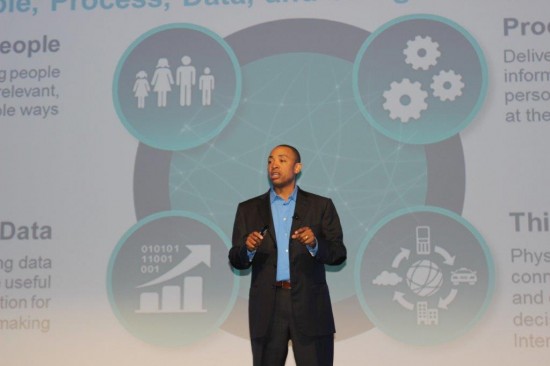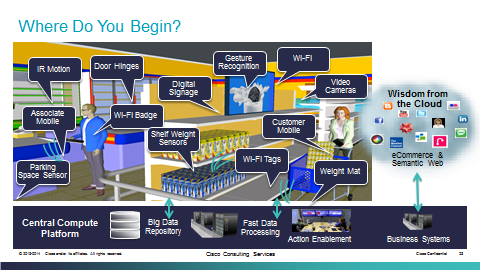































This week, I had the opportunity to focus on digital business as an attendee and presenter at Gartner's ITxpo in Orlando, Fla. It was a sold out crowd with 8,500 attendees and approximately 2,700 CIOs. And one insight that seemed to resonate with the audience was Gartner's belief that by 2018, digital business will require 50 percent fewer business process workers and 500 percent more key digital business jobs.
 At the ITxpo discussing how the Internet of Everything enables the transition to Gartner's All Things Digital
At the ITxpo discussing how the Internet of Everything enables the transition to Gartner's All Things DigitalWe already live in a world that is rapidly connecting people, process, data, and things in ways that were unimaginable just a few years ago. I believe that IoE is a key driver of this transition and a fundamental stepping stone to making "All Things Digital."
Gartner defines All Things Digital as "blurring the physical and digital worlds to create new business designs." Interestingly, Gartner focuses on people, business, and things, but omits process. Gartner's view is that process will happen dynamically and be measured in not months or weeks, but nanoseconds. While this is a true statement, it reflects the end goal. The key question is, how does an enterprise become digitally enabled?
A first step in transitioning to All Things Digital, is embracing IoE by lighting up "dark assets." A dark asset is something that is currently not connected to the Internet. A dark asset in itself however, does not create value. ln All Things Digital, connected devices begin to talk with other connected devices. These devices interact with one another dynamically, which in turn creates processes in just nanoseconds. In this environment, IoE allows you to understand what process to focus on and which assets to connect. In other words, IoE is the pathway to Gartner's All Things Digital. The overarching goal is business outcomes. One retail example is connecting a parking lot to a retail store. In a recent trial, we found that data from parking lot sensors, when analyzed correctly, can predict when checkouts will get busy, so that more cashiers can be deployed. There are many other dark assets in a retail environment that have the potential to increase revenue, lower costs, and grow margins once they are lit up.

Another theme from the conference concerned the Implications of All Things Digital for IT. If you are just beginning your IoE journey, IT needs to become a strategic asset. Gartner calls it dual-IT. They discussed how to "keep the lights on" while at the same time driving innovation. In another study, Cisco found that 83 percent of IT spending is still directed towards keeping the lights on,[FAST IT] and only 17 percent is spent on innovation. By implementing a simple, smart, and secure IT strategy - featuring agile and programmable infrastructure - an IT organization can drive as much as 20-25 percent savings. This frees up a significant amount of money that can be redirected into innovation, enabling the IT organization to become a true partner for business outcomes. And when innovation is done correctly, a virtuous cycle is created - innovation drives increased revenues, which can then be applied to driving further innovation.
After thinking about the event, one thing became crystal clear - Gartner's vision of All Things Digital goes hand-in-hand with IoE. Now is the time to identify and light up dark assets asEverythingbecomes truly digital.
 Tags quentes :
IoE
Analytics
dados
Gartner
Fast IT
CCS
Future of IT
informação
All Things Digital
Tags quentes :
IoE
Analytics
dados
Gartner
Fast IT
CCS
Future of IT
informação
All Things Digital